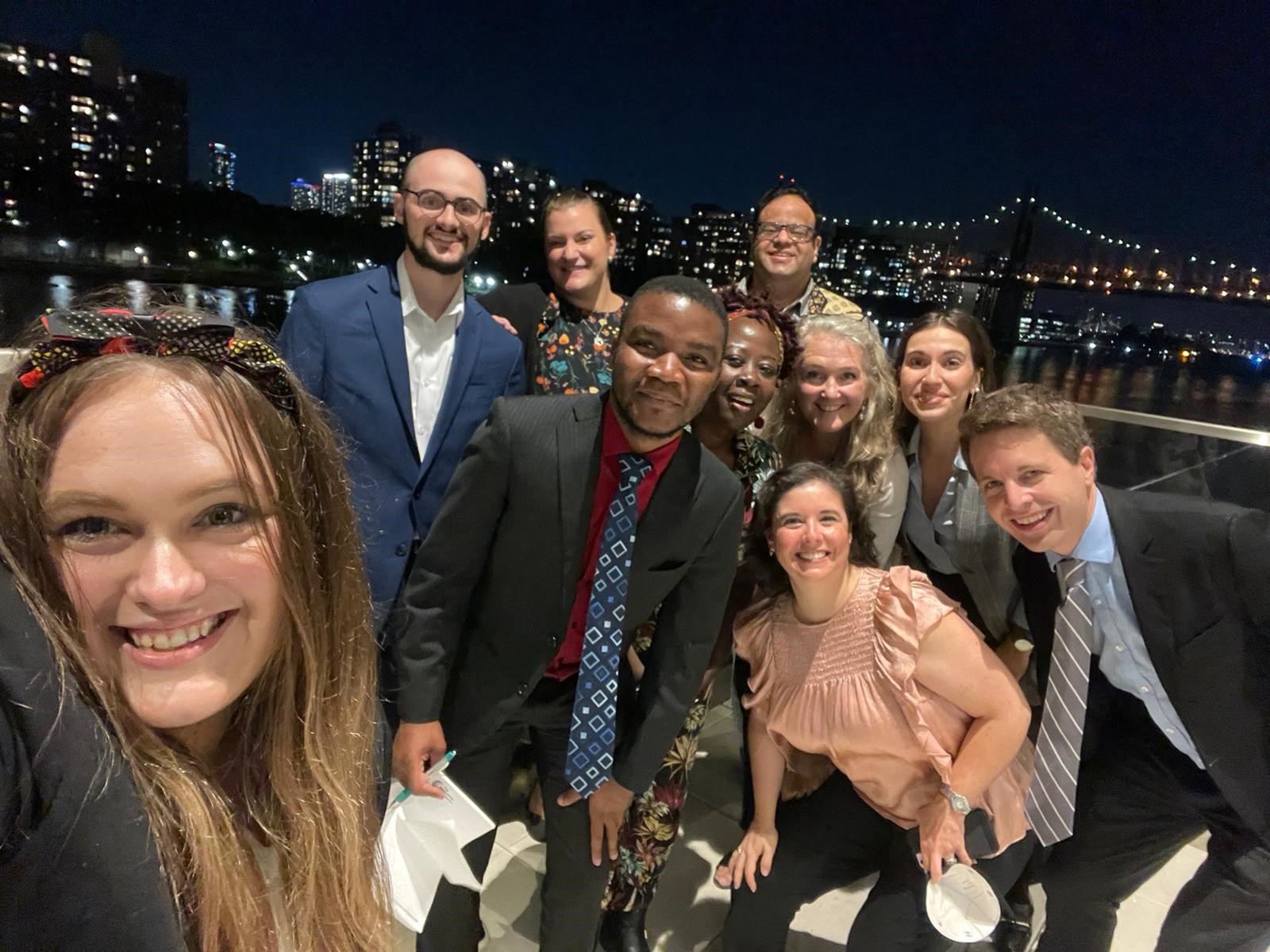In 2020, I realized that if anyone was going to drive this world out of a pandemic and improve the healthcare profession on a global scale, it was going to be a nurse.
What I didn’t realize, is that it was going to be me. Greetings from #UNGA #UNGA77 🇺🇳❤️ pic.twitter.com/r0YPWd3BZC
— Amy Staley (@AmyStaleyRN) September 20, 2022
77th UNGA Reflections: Sabin delegation attends high-level events to urge leaders to invest in communities and vaccine professionals to boost equity and acceptance
Last month, the Sabin Vaccine Institute and our partners around the world joined leaders from government, international institutions, civil society, and philanthropy gathered in New York City for the 77th U.N. General Assembly (UNGA) to advance key global health issues.
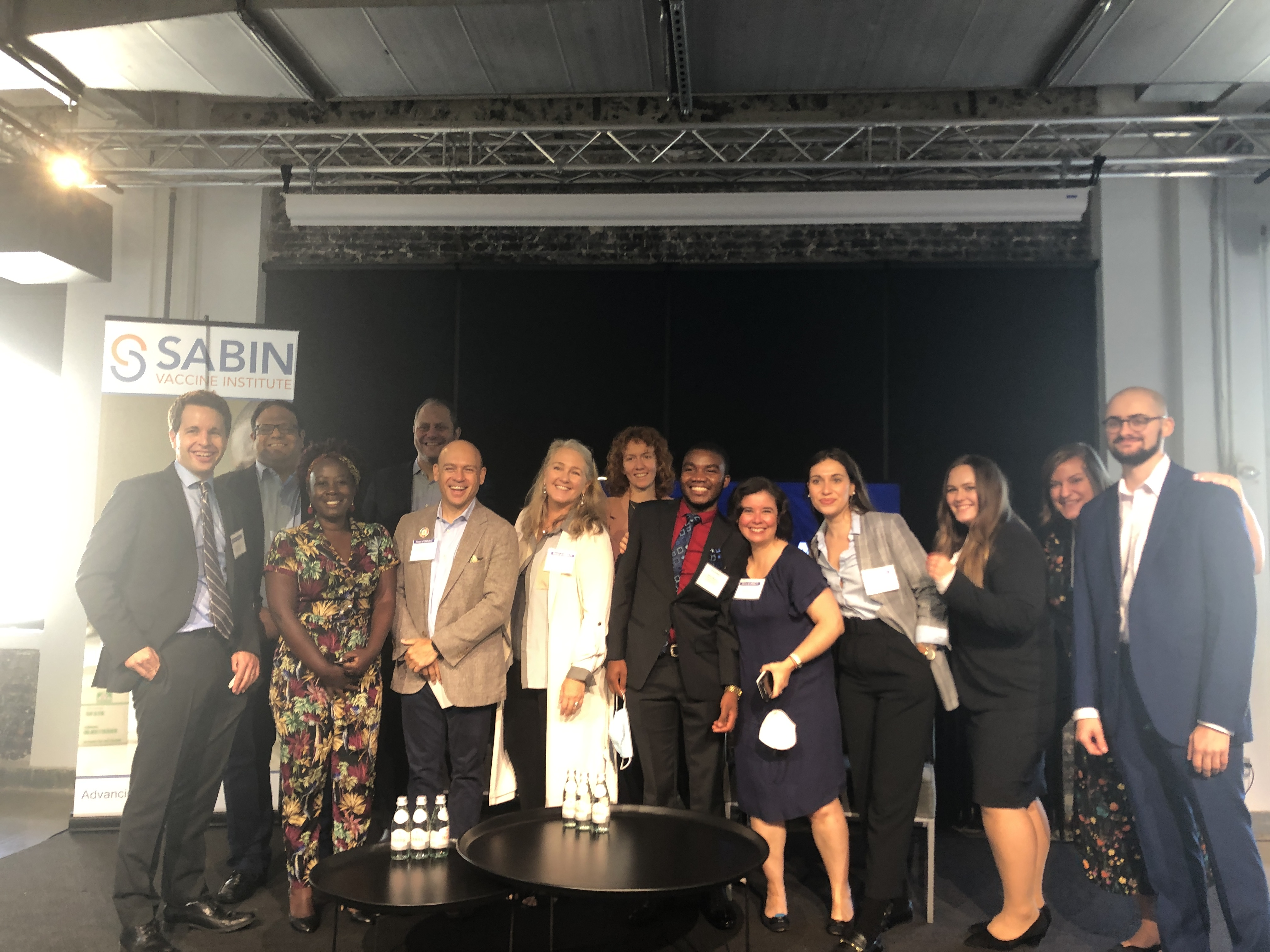
Sabin’s UNGA delegation
Sabin led and partnered on high-level side events at UNGA to urge global leaders to invest in the professionals closest to vaccine decision-making and delivery. Our Sabin Vaccine Acceptance & Demand delegation included:
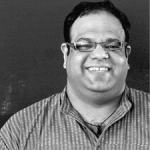 Dr. Anant Bhan: Bhan is a mentor and principal investigator at Sangath in Bhopal, India. He is a researcher in global health, health policy, bioethics, and mental health and is a Sabin Social and Behavioral Research Grants Program 2021-2022 partner.
Dr. Anant Bhan: Bhan is a mentor and principal investigator at Sangath in Bhopal, India. He is a researcher in global health, health policy, bioethics, and mental health and is a Sabin Social and Behavioral Research Grants Program 2021-2022 partner.
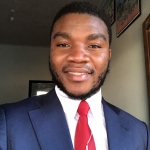
Rashid Mang’anda: Mang’anda is a Nursing Officer at Phalombe District Hospital in Southern Malawi. He is the district coordinator for the Malawi Ministry of Health’s maternal and child health program and the focal person for COVID-19 disease surveillance in the region. He co-founded a community charity organization called the Center for Elderly Support in Malawi. Mang’anda is also a Sabin-Nursing Now Challenge Immunization Advocacy Champion.
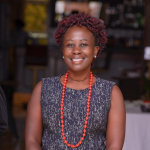 Esther Nakkazi: Nakkazi is a health and science reporter based in Kampala, Uganda. She is also a media trainer, the founder of the Health Journalists Network in Uganda, and the lead media trainer for Africa the International Women’s Media Foundation Global Health Reporting Initiative focused on reporting on vaccines, which is supported by Sabin. Nakkazi contributes to media outlets around the globe.
Esther Nakkazi: Nakkazi is a health and science reporter based in Kampala, Uganda. She is also a media trainer, the founder of the Health Journalists Network in Uganda, and the lead media trainer for Africa the International Women’s Media Foundation Global Health Reporting Initiative focused on reporting on vaccines, which is supported by Sabin. Nakkazi contributes to media outlets around the globe.

Amy Staley: Staley is a board-certified Staff Nurse for the Orthopedic/Vascular Medical Surgical unit at New York Presbyterian/Weill Cornell in New York, United States. She is a charge nurse, preceptor, and co-chair of the Nursing Communications Committee, in addition to being a Sabin-Nursing Now Challenge Immunization Advocacy Champion.
Sabin delegation attends high-level side events
Bhan, Mang’anda, Nakkazi, and Staley spoke on several high-level panels to share their first-hand expertise and experiences with vaccines and discuss community needs and investments needed to sustain vaccine acceptance and demand and increase immunization rates.
Trust, says @Nakkazi, is key to fight a #pandemic and protect people with #vaccines. Journalists are vital to build trust in society and ensuring communities understand the benefits of #immunization. @sabinvaccine @IWMF #Devexevent pic.twitter.com/rWngfyKsAz
— Nadia Peimbert (@npeimbert) September 21, 2022
Bhan, Mang’anda, Nakkazi, and Staley, along with Sabin VP of Vaccine Innovation & Global Immunization Stacey Knobler, participated in a prominent event led by Sabin and Devex on reversing the alarming decline of routine immunization and building and sustaining vaccine demand with and for communities. During this event, the group discussed barriers to equitable vaccine access and demand, the complexities of vaccine demand in low- and middle-income countries, the challenges of misinformation, and the role of communities in immunization.
Other national and global health leaders joined Sabin for this event, including (in alphabetical order) Dr. Ayoade Alakija, WHO Special Envoy, ACT Accelerator & Co-Chair AU Africa Vaccine Delivery Alliance; William Asiko, Vice President, Africa Regional Office, Rockefeller Foundation; Dr. Atul Gawande, Assistant Administrator for Global Health, USAID; and Dr. Aamer Ikram, Executive Director, Pakistan National Institutes of Health and Head COVID-19 response; Dr. Furaha Kyesi, Paediatrician and Public Health Specialist, Ministry of Health, Community Development, Gender, Elderly, and Children; and Dr. Kate O’Brien, Director, Immunization, WHO.
The Sabin delegation also took part in a forum, co-hosted by Sabin and partners of the Frontline Health Workers Coalition, intended to spark a global movement to better protect and support health workers everywhere.
Finally, Mang’anda engaged in an event organized by The Rockefeller Foundation and Amref Health Africa on how the Vaccination Action Network facilitates transforming local insights into action. Acting Director of Africa Centers for Disease Control and Prevention (CDC) Dr. Ahmed Ogwell Ouma, Gavi, the Vaccine Alliance CEO Dr. Seth Berkley, and Sabin VP of Vaccine Innovation & Global Immunization Stacey Knobler also spoke on the panel.
2/ Rashid Mang'anda @shidomanganda is a healthcare worker from Malawi. He kicked off the event with @rispahw by sharing on-the-ground insights into the barriers of Covid vaccination, i.e., environmental challenges, vaccine hesitancy, & lack of supplies. pic.twitter.com/oqoyWteFwr
— The Rockefeller Foundation (@RockefellerFdn) October 3, 2022
In addition to these high-level events, Bhan, Mang’anda, Nakkazi, and Sabin Director of Research Dr. Kate Hopkins joined Vince Blaser and me on Sabin’s podcast, Community Conversations on Vaccines, presented by Immunization Advocates, to reflect on UNGA, share their experiences with vaccine acceptance and demand in communities, and consider how to overcome to maintain vaccine confidence and build vaccine equity. Episode 1 is available now wherever podcasts are found.
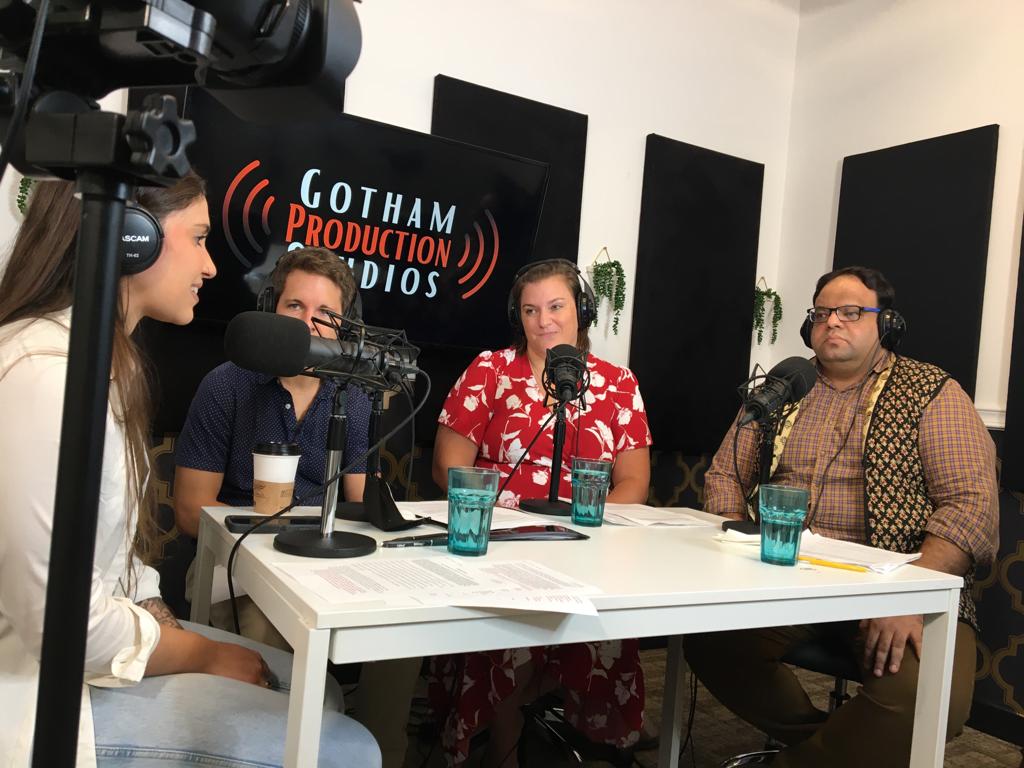
What have we learned? What’s next?
These UNGA side discussions and events made it clear that health workers, journalists, and researchers, as well as other professionals close to vaccine decision-making and delivery, are key drivers of vaccine information and play critical roles in vaccine access and demand – they need to be directly engaged with policymakers and influencers at forums like this. We must not only hear them but must also support them and champion community-led and multisectoral programs that address vaccine equity and acceptance.
Q: how do we move forward? @AnantBhan says, “ 1️⃣ we need to build and sustain trust in communities 2️⃣ we need to listen to and work w communities” @sabinvaccine #UNGA #devexevent https://t.co/DPxTjWRbcQ pic.twitter.com/SkdmRSffyy
— Meredith Dockery (@meredithdockery) September 21, 2022
Moreover, we must give health workers the tools and services necessary to support communities. Mang’anda stresses, “[We must] take care of the healthcare workers first, and they will be able to do their jobs well and look after the communities.”
To do so, health workers need liveable wages, transportation and fuel, housing, communication tools, platforms to share expertise, and capacity-building resources among health workers
“Paying frontline health workers is not groundbreaking. It’s absolutely basic.” – Emma France, mothers2mothers
In addition to and in conjunction with investing in health workers and other trusted community leaders and on-the-ground professionals, we must work to decolonize global health, not just with our words but with concrete and substantial actions. Western and high-income country control of health, from vaccine manufacturing to public health programming, perpetuates socioeconomic, racial, and health inequities. Advocates for diversity, equity, and inclusion (DEI) should not merely make statements of support, should not speak into the echo chamber with already forgotten promises. As true DEI advocates, we must act to break the cycle and cultivate concrete, systemic change.
“For too long, #PublicHealth projects in Africa have been run by non-African institutions … We need to use local, indigenous institutions.” – Dr. Ahmed Ogwell Ouma, Acting Director, @AfricaCDC #UNGA #UNGA77 @Amref_Worldwide @RockefellerFdn pic.twitter.com/zPcCtPKjdR
— Francesca Montalto, MPH (@CiciMontalto) September 21, 2022
Leaders at UNGA noted several actions we can take – including working toward the Africa Union goal of 60% of routine vaccinations utilized in Africa being manufactured on the continent by 2040, funding community-level work, and advocating governments and multilateral institutions such as Gavi to co-finance investments with governments for the health workforce and systems needed to deliver vaccines and vaccine information.
‼️‼️ “We need to put pressure on governments & donors to fund CSOs because that work is being appropriated by international organizations and is keeping the money elsewhere. We need to fund community level work.” – @yodifiji #UNGA #UNGA77 #DevexEvent @ACTAccelerator https://t.co/ZrgWKO77HZ
— Francesca Montalto, MPH (@CiciMontalto) September 21, 2022
This year’s UNGA, a first in-person event for many in recent years, provided the tremendous opportunity to personally and professionally connect with individuals and organizations who have the passion for and capacity to foster health equity and justice.
5/🧵 So what's next? The hard work is always in the follow up. But I'm thankful these professionals' dogged efforts that enabled us to meet in person at #UNGA77. The bonds built will enable all of us to work in solidarity to reverse immunization declines & foster #VaccinEquity. pic.twitter.com/x9KYMyCS79
— Vince Blaser (@blaserv) September 27, 2022
We at Sabin look forward to the work ahead and to engaging these connections and applying UNGA conversations and learnings to reverse immunization declines and sustain vaccine acceptance and demand with the understanding that crucial to those goals is also advocating for universal health coverage and health equity and justice around the globe.
